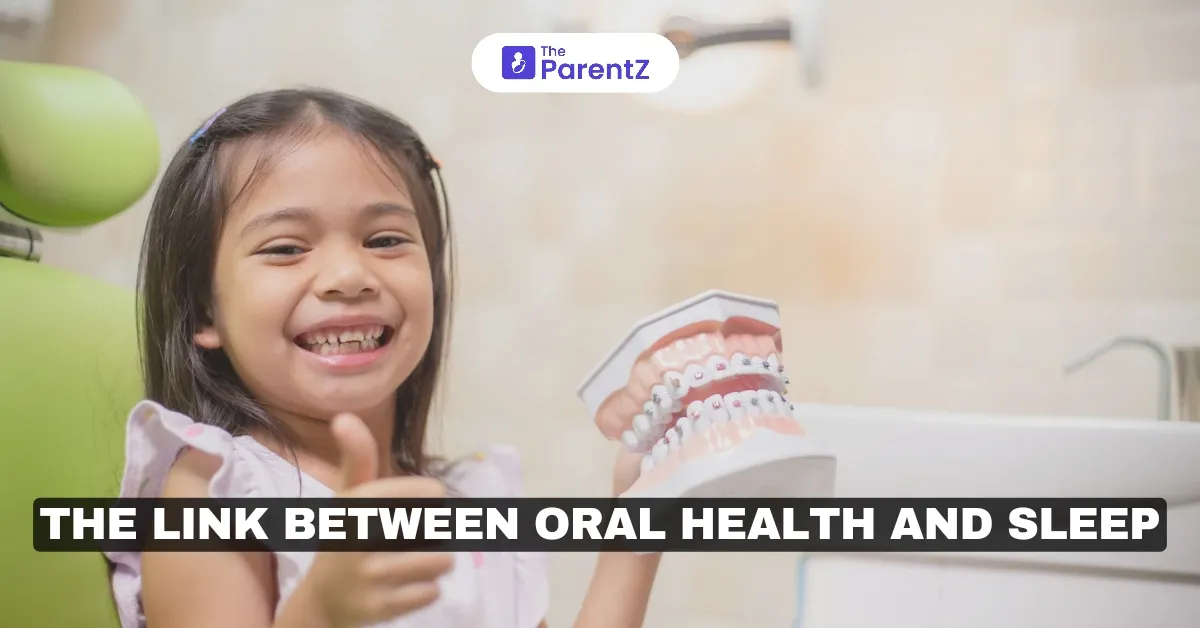Oral health and sleep share a bidirectional relationship, where the state of the mouth can influence sleep quality and vice versa. This interplay impacts overall well-being, as both oral and sleep disorders can lead to systemic health issues if left unaddressed.
How Oral Health Affects Sleep
1. Sleep-Disordered Breathing (SDB) and Oral Conditions
Sleep disorders like obstructive sleep apnea (OSA) are closely related to oral health. Key connections include:
• Narrow Oral Airways: Anatomical factors such as a small jaw (micrognathia) or enlarged tonsils can contribute to airway obstruction during sleep.
• Bruxism (Teeth Grinding): Often linked with stress or sleep apnea, bruxism can cause tooth wear, jaw pain, and disrupted sleep.
2. Dry Mouth (Xerostomia)
Dry mouth, caused by reduced saliva flow, often leads to poor sleep quality due to discomfort, difficulty swallowing, or even waking up frequently. It can result from medications, mouth breathing, or salivary gland disorders.
3. Periodontal Disease and Sleep
Chronic gum disease can contribute to systemic inflammation, potentially leading to disturbed sleep patterns. Periodontal inflammation may worsen conditions like SDB by increasing airway resistance.
How Sleep Impacts Oral Health
1. Mouth Breathing
Sleeping with an open mouth can dry out saliva, which plays a crucial role in protecting against cavities and gum disease. Chronic mouth breathing also alters oral pH, making the environment more conducive to bacterial growth.
2. Hormonal Imbalance from Poor Sleep
Inadequate sleep can disrupt the production of hormones like melatonin, which has antioxidant properties that protect oral tissues. Hormonal imbalances can increase susceptibility to gum disease and slow wound healing.
3. Increased Risk of Bruxism
Sleep deprivation and stress often exacerbate bruxism, leading to enamel erosion, tooth sensitivity, and temporomandibular joint (TMJ) issues.
Oral Conditions That Worsen Sleep Quality
1. Temporomandibular Joint Disorders (TMDs): Pain in the jaw joint can make falling and staying asleep difficult.
2. Oral Ulcers or Sores: Conditions like lichen planus or recurrent aphthous ulcers can cause discomfort and disrupt sleep.
3. Snoring and OSA: Poor oral alignment or excessive soft tissue can worsen airway obstruction, leading to frequent awakenings.
Tips to Improve Oral Health and Sleep
1. Address Snoring or Sleep Apnea
• Use oral appliances prescribed by a dentist to maintain open airways during sleep.
• Seek medical evaluation for CPAP therapy if apnea is severe.
2. Maintain Proper Oral Hygiene
• Brush and floss daily to reduce inflammation that can worsen sleep-disordered breathing.
• Stay hydrated to combat dry mouth and promote healthy saliva flow.
3. Treat Bruxism
• Use a custom-made night guard to protect teeth and jaw muscles.
• Incorporate stress management techniques like meditation or yoga to reduce teeth grinding.
4. Stay Consistent with Dental Checkups
Regular dental visits can help identify and manage oral conditions that might interfere with sleep.
5. Improve Sleep Hygiene
• Establish a regular sleep routine.
• Avoid caffeine and heavy meals before bedtime.
• Create a comfortable and quiet sleep environment.
Personal Perspective as a Dentist
In my experience, many patients remain unaware of how oral conditions affect their sleep until it significantly impacts their daily life. I once treated a patient with severe bruxism who complained of frequent headaches and poor sleep. After fitting her with a night guard and recommending stress management techniques, she experienced dramatic improvements in both her sleep and oral health. Cases like these highlight the importance of addressing oral health as a component of better sleep hygiene.
A Wake-Up Call for Better Health
The connection between oral health and sleep underscores the importance of taking a holistic approach to well-being. By addressing oral conditions, you can not only enhance your sleep quality but also improve your overall health. Start by making small changes today—your body will thank you for it.
References
• Huynh N, Kato T, Rompré PH, et al. “Sleep Bruxism and the Risk of Sleep Apnea.” PubMed Central.
• Ferguson KA, Ono T, Lowe AA. “The Impact of Oral Appliances on Sleep Apnea Management.” PubMed Central.
• Siqueira WL, et al. “Saliva and Sleep Quality: A Comprehensive Review.” PubMed Central.





Be the first one to comment on this story.